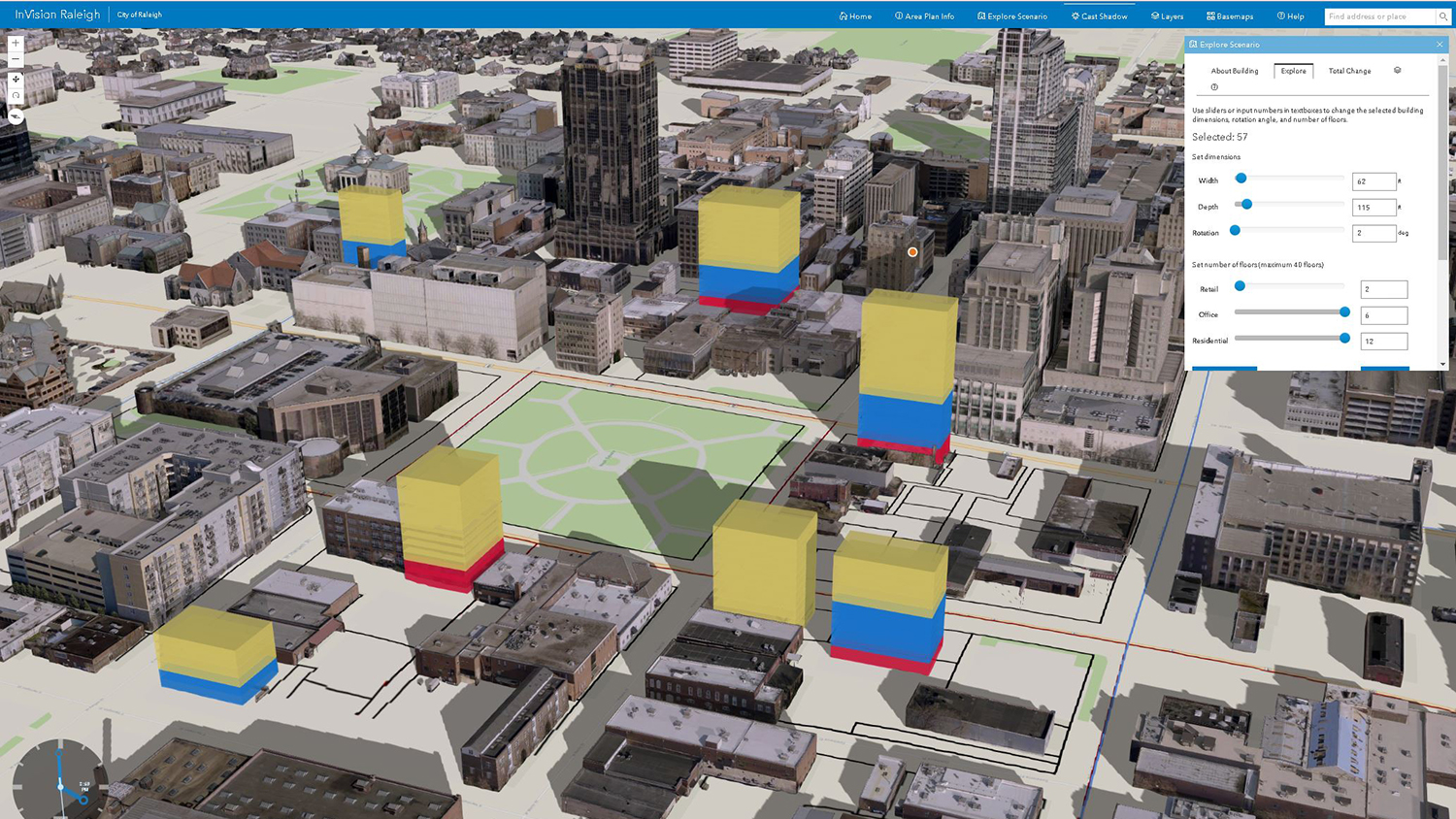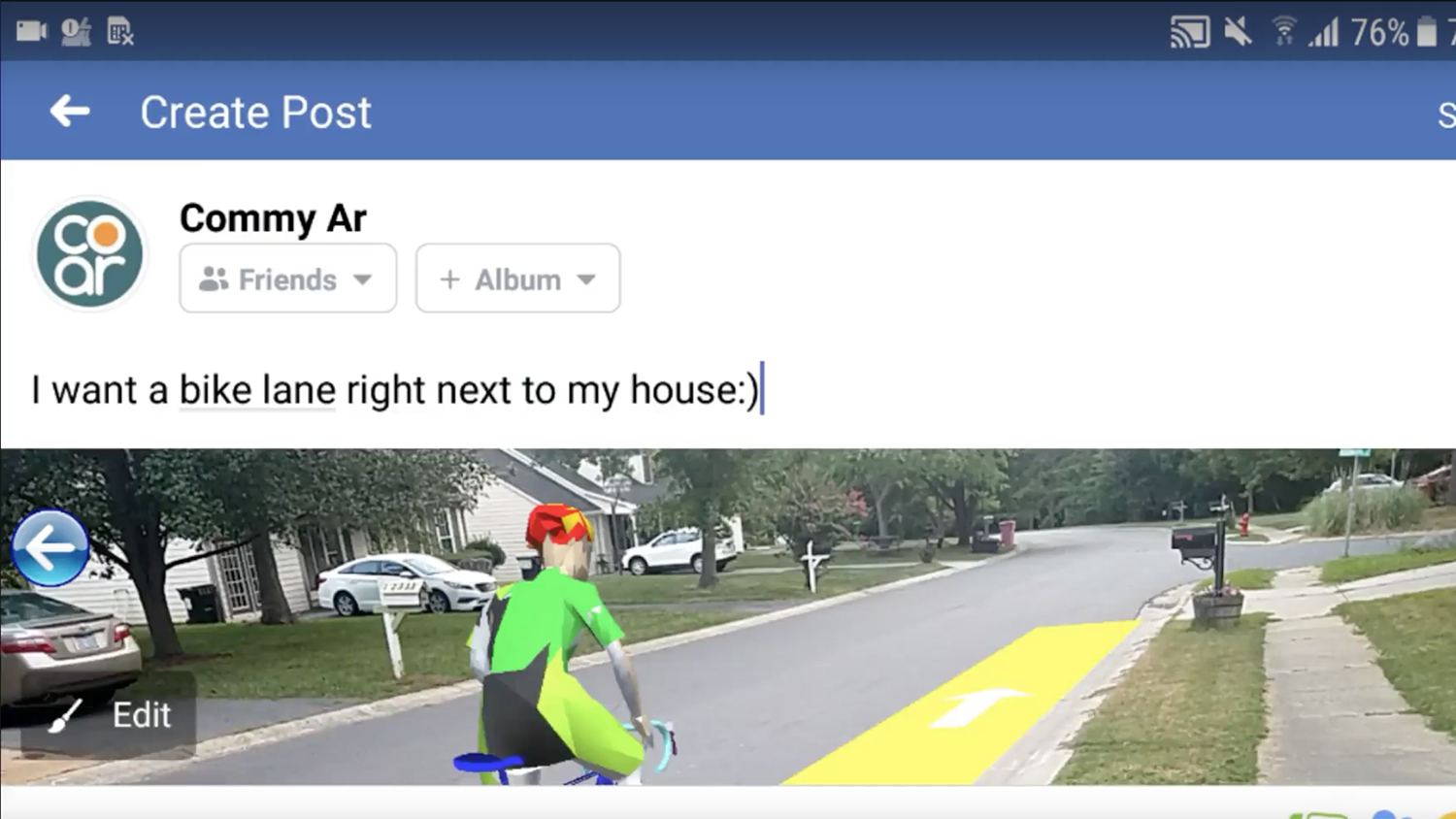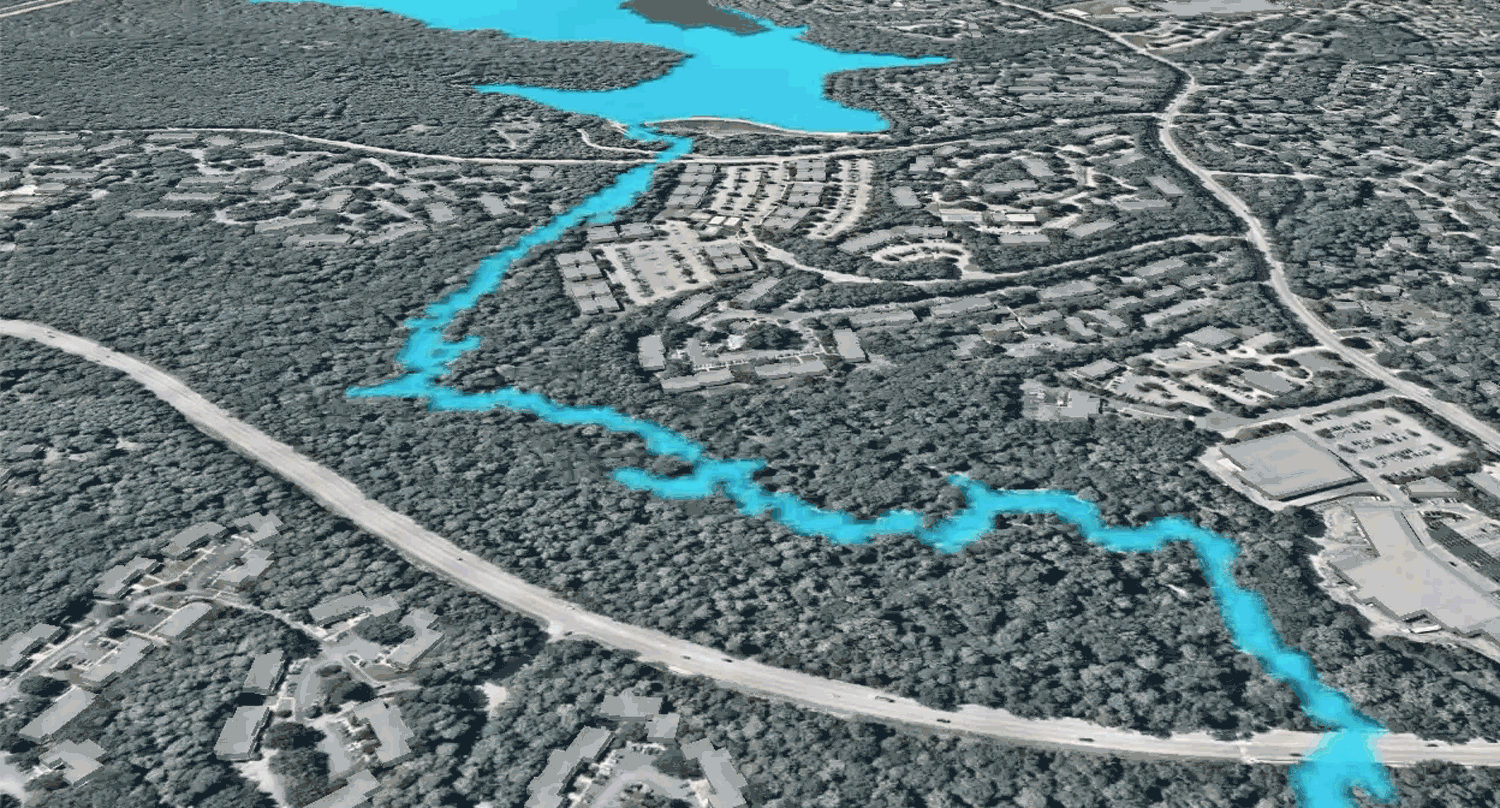TomorrowNow
Welcome to TomorrowNow, a project to put big data and sophisticated models into the hands of everyone in the Triangle region of North Carolina. Join us!

What is TomorrowNow?
TomorrowNow is a collaborative project led by four universities in North Carolina focused on developing a serious game that can help a greater number, and a greater diversity, of people affect decisions that impact the places where they live and work. We are using real spatial data and developing interactive technologies that can help build common understanding of challenges in the Triangle, and figure out how to address them.
Funded by the National Science Foundation (Award Number 1737563), our Research Coordination Network unites government officials, academic researchers, industry leaders and members of community groups and other organizations to co-develop a serious game that will tackle challenges related to rapid urbanization and stormwater management in the Triangle.
What has the project done so far?
Built a network of thought leaders
We want our project team to be as diverse and inclusive as possible, and we are always looking for new members! Meet our Research Collaboration Network, a growing number of partners on an Interdisciplinary Steering Committee and Stakeholder Advisory Board:
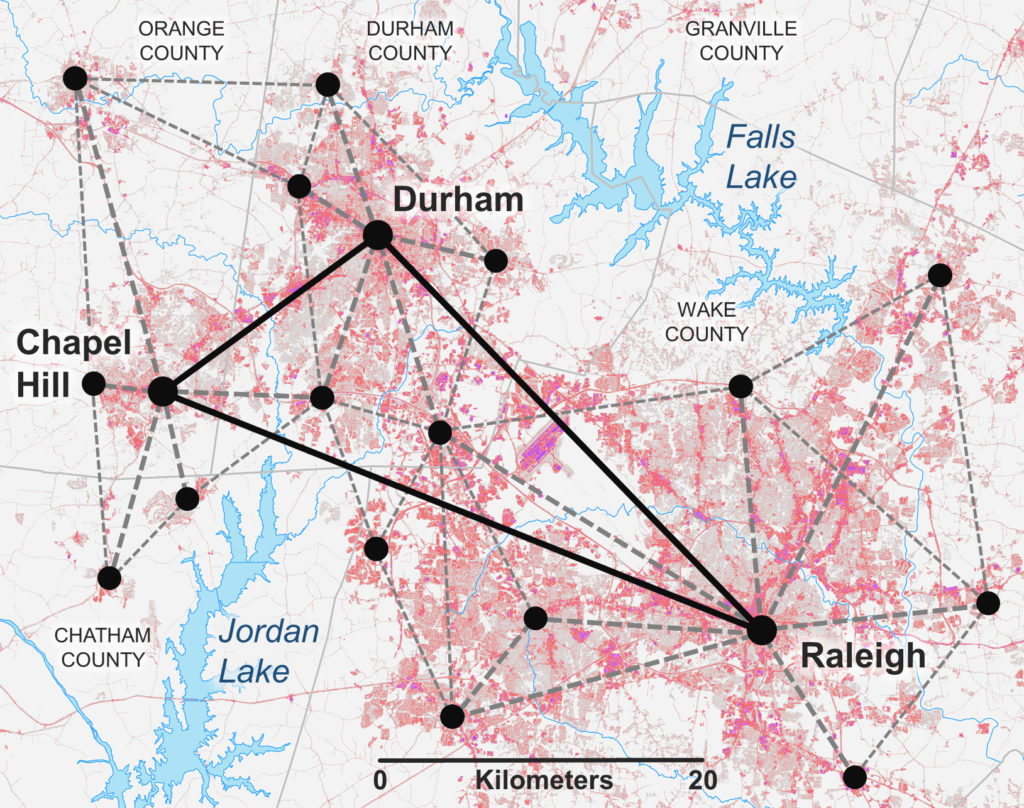
- Universities: North Carolina State University, University of North Carolina at Chapel Hill, Duke University, North Carolina Central University
- Municipalities: City of Raleigh, City of Durham, Town of Chapel Hill, Town of Cary, Wake County, Durham County, Orange County
- Community and non-governmental organizations: South Atlantic Landscape Conservation Cooperative, Water Resources Research Institute
Meet the Interdisciplinary Steering Committee
North Carolina State University
- Ross Meentemeyer, Lead Principal Investigator (PI); director, Center for Geospatial Analytics;
expertise: geospatial analytics, urbanization modeling, sustainability solutions - Helena Mitasova, Co-PI; professor, Department of Marine, Earth and Atmospheric Sciences;
expertise: dynamic geosimulations, geovisualization, hydrological modeling - Corey White, Network Coordinator; Ph.D. student, Center for Geospatial Analytics;
expertise: GIS for local governments, software engineering - Tiffany Barnes; associate professor, Department of Computer Science;
expertise: serious games, artificial intelligence, advanced learning technologies - Emily Berglund; associate professor, Department of Civil, Construction, and Environmental Engineering;
expertise: complex adaptive systems, water infrastructure and engineering - Okan Pala; research associate, Center for Geospatial Analytics;
expertise: critical infrastructure and disaster response - Walter Robinson; professor, Department of Marine, Earth, and Atmospheric Sciences;
expertise: climate variability and extreme precipitation events
University of North Carolina at Chapel Hill
- Todd BenDor, Co-PI; associate professor, Department of City and Regional Planning; expertise: urban growth, environmental planning, and markets for water resources
- Danielle Spurlock; assistant professor, Department of City and Regional Planning;
expertise: city planning, public health, social justice - Andrew Yates; associate professor, Department of Economics;
expertise: environmental economics, pollution permit market design - Kathleen Gray; associate director, Environmental Resource Program at the UNC Institute of Environment;
expertise: environmental health, science education and engagement
Duke University
- Emily Bernhardt; Co-PI; professor, Department of Biology;
expertise: watershed biogeochemistry, restoration, urban ecology - Dean Urban; professor of landscape ecology, Environmental Science and Policy Division of the Nicholas School of the Environment;
expertise: conservation planning, environmental management and policy - Megan Mullin; associate professor of environmental politics, Environmental Science and Policy Division of the Nicholas School of the Environment;
expertise: water management, policy, and governance - Michael Hensen; assistant director, Center on Globalization, Governance, and Competitiveness;
expertise: global change, public health, value chains
North Carolina Central University
- Kevin Foy; Co-PI; associate professor, School of Law;
expertise: urban sustainability, land use law
Meet the Stakeholder Advisory Board
- Jim Alberque, GIS and Engagement Technology Manager, City of Raleigh – Information Technology
- Dan Ault, Assistant Town Manager and Chief Innovation Officer, Town of Cary
- Perver Baran, Teaching Associate Professor, Center for Geospatial Analytics, NC State University
- Emily Barrett, Sustainability Manager, Town of Cary
- Janet Cakir, NPS SER Climate Change, Socioeconomics, and Adaptation Coordinator, South Atlantic Landscape Conservation Cooperative
- Randy Dodd, Stormwater Utility Manager, Town of Carrboro
- Derek Gatlin, Proposal Developer, Proposal Development Unit, NC State University
- Tom Fransen, Water Planning Section Chief, NC Department of Environmental Quality
- Blair Hinkle, Assistant Department Director of Engineering Services, City of Raleigh – Engineering Services
- Sally Hoyt, Stormwater Engineer, UNC-Chapel Hill Energy Services
- Jamie Kritzer, Assistant Director of Communications, NCDOT Communications Department
- Reid Serozi, Analytics and Innovation Manager, Town of Cary
- Jamie Smedsmo, UNC Chapel Hill Energy Services
- Adam Terando, Research Ecologist and Adjunct Professor, USGS and Department of Applied Ecology, NC State University
- Carter Vickery, GIS System and Applications Supervisor, Wake County
- Heath Wadsworth, Senior Engineer, Draper Aden Associates
- Allison Weakley, Stormwater Analyst, Town of Chapel Hill Public Works Department, Stormwater Management Division
- Susan White, Director, Water Resources Research Institute of the University of North Carolina
Want to join the conversation? Contact Network Coordinator Corey White!
Hosted two workshops to understand stormwater challenges
On May 16, 2018, over thirty project partners gathered at the Center for Geospatial Analytics for a kick-off workshop to discuss project goals and provide input on challenges and opportunities in the Triangle for stormwater management and civic engagement. We surveyed participants about their experiences and views and compiled their responses in a workshop report. Agree or disagree with anything in the report? We want to hear from you! Contact Network Coordinator Corey White and get access to the discussion on Slack.
On April 12, 2019, over thirty project partners again gathered at the Center for Geospatial Analytics to provide input for the development of the TomorrowNow prototype. Participants created fuzzy cognitive maps to serve as a basis for the game engine, identified stormwater problem areas in the Triangle and explored how to tackle these issues by collaboratively designing mini-games. A workshop report is forthcoming; until then, keep the conversation going on Slack!
What might a spatial serious game look like?
What’s next?
Keep brainstorming with us!
Thank you to all who attended the dynamic brainstorming workshop on April 12, 2019. Let’s keep talking on Slack! Remember to introduce yourself on the #introductions channel, keep exploring stormwater issues in the #challenges channel and chime in on your team channels.
Questions? Contact Network Coordinator Corey White.
How can I get involved?
Can’t make it to a workshop? There are still plenty of ways to contribute to the TomorrowNow project. Do as much or as little as you like!
NEW: Sign up for the beta!
Are you an early adopter? Enjoy playing with experimental beta versions of new technologies? Get in on the ground floor of TomorrowNow by signing up to test our forthcoming beta!
Join the Stakeholder Advisory Board
Do you represent a community of people whose interests and needs should be heard at planning workshops and goal-setting meetings? Does your community have expertise in stormwater management or is directly impacted by it? Contact Network Coordinator Corey White to join the Stakeholder Advisory Board! Each member of the board is invited to in-person gatherings and automatically receives a login to TomorrowNow on Slack, the online forum that keeps discussion going between meetings.
Attend Public Symposiums
In the future, the Research Collaboration Network will host public symposiums open to anyone who wants to attend. At these symposiums, the Interdisciplinary Steering Committee and Stakeholder Advisory Board will present project progress, share the latest research related to serious games, and seek feedback from attendees.
Join TomorrowNow on Slack
Don’t have time to attend workshops or symposiums? No problem! The Research Collaboration Network maintains an online space for constructive discussion called TomorrowNow on Slack. This online forum hosts project updates and reports as well as discussion threads. We invite anyone interested in the project to contact Corey White to join the conversation. Make your voice heard by posting comments, or simply listen to what others have to say!
News and Updates
More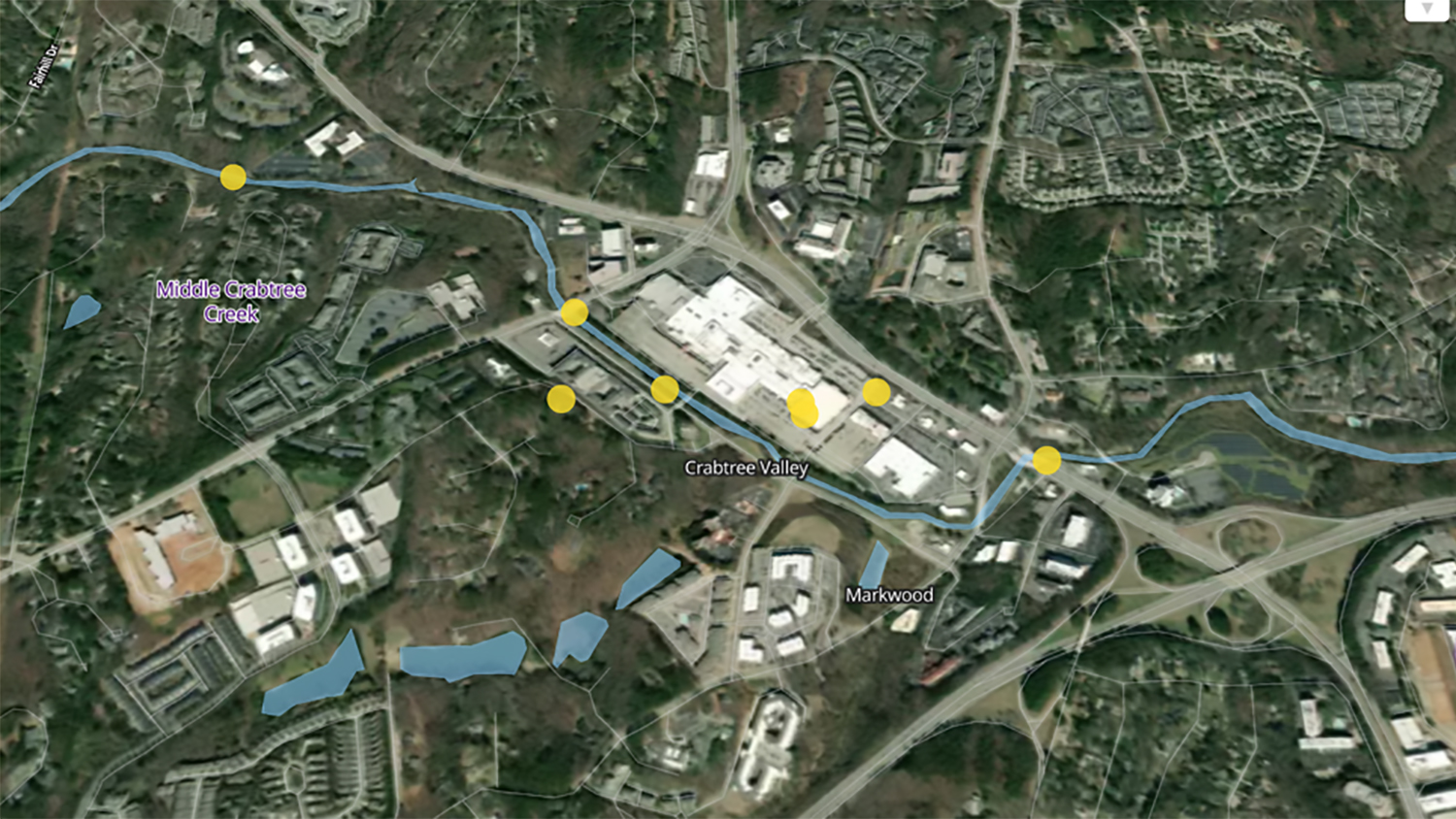
Untangling the Complexity of Stormwater Problems
Read More

Triangle Smart Cities Summit
Read More

Using Big Data to Boost Public Engagement in Urban Planning
Read More
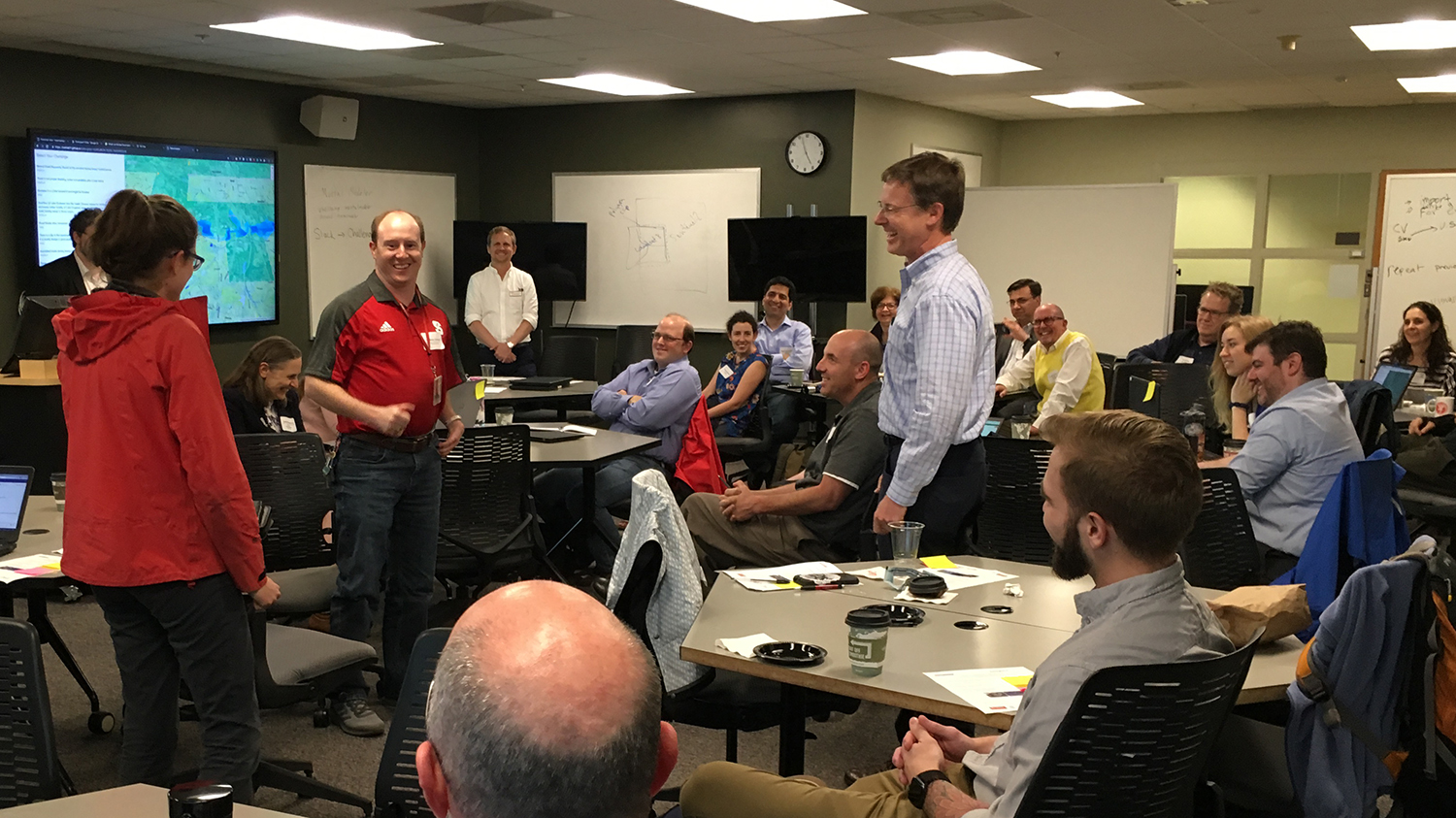
Second Workshop Moves Project Forward
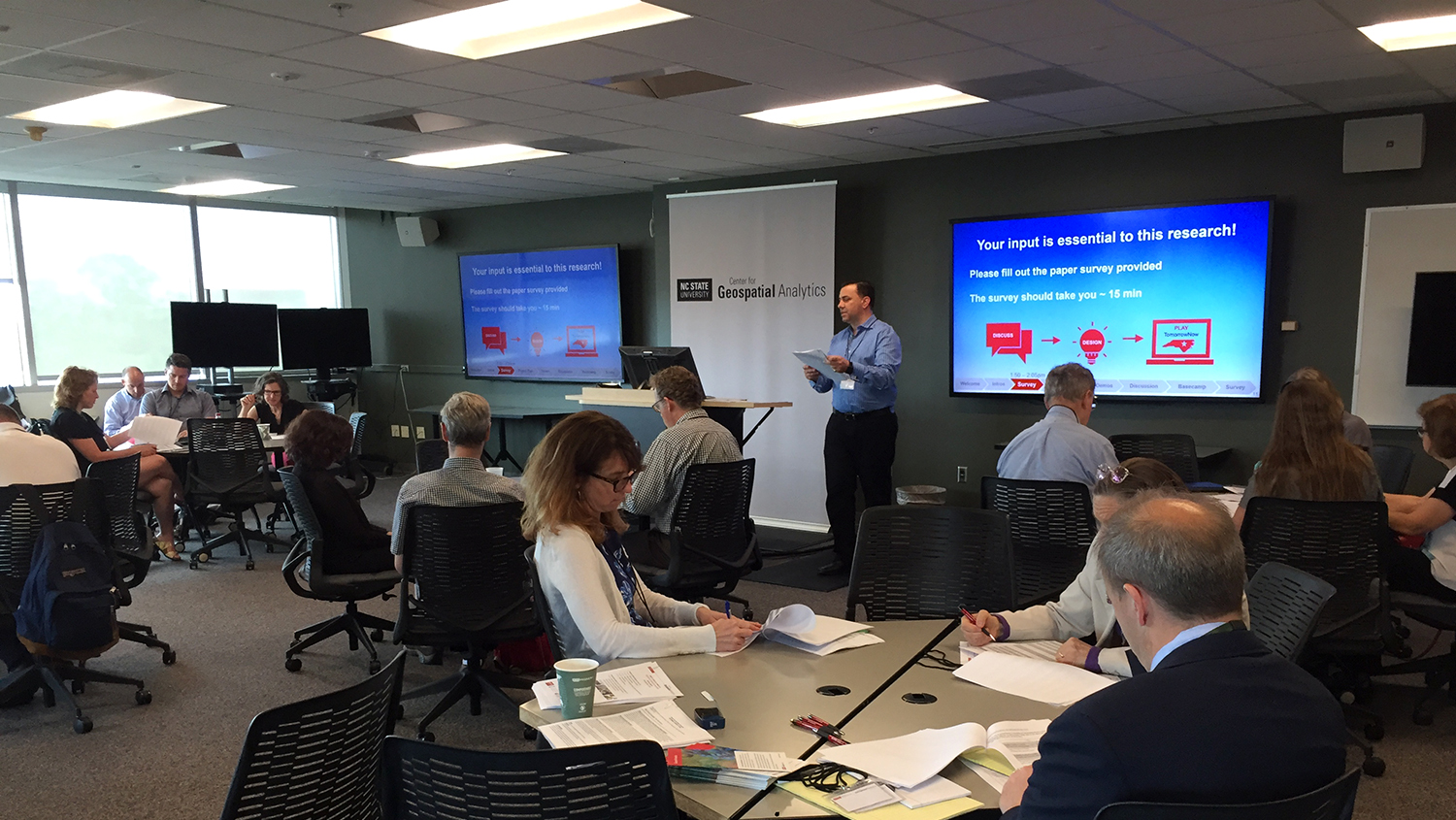
First Workshop a Success

NSF Grant Funds Smart City Research to Tackle Regional Problems with Serious Games
Read More
